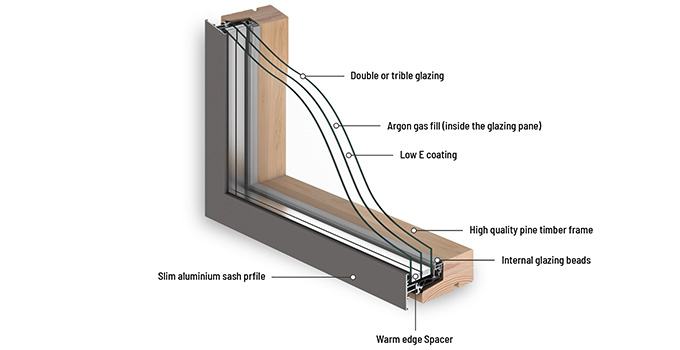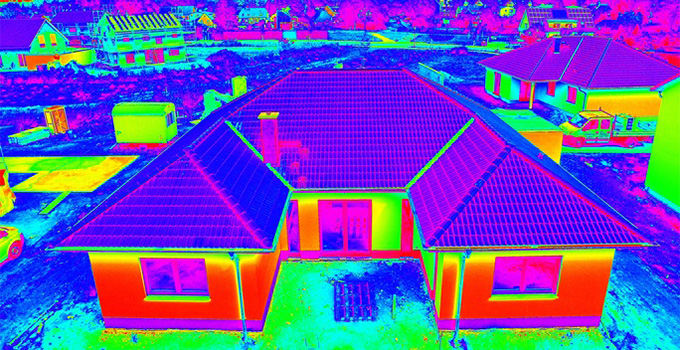You might have not noticed, but when you look out through your windows, you are very likely to see through several layers of glass. Unless your windows are very old, there will typically be two or three layers of glass, and if you are planning to install new windows, the choice will also be between double or triple glazing.
What should you choose?
Like everything else, the choice between double or triple glazing depends on a number of factors such as your home’s level of insulation, your attitude to environmental impact in relation to heat consumption, and your budget. We will guide you through the individual factors, and help you to make a comparison between double and triple, but first let’s look at how a modern window is constructed.

Glass and gas keep you warm
Regardless of whether the window has two or three layers of glass, the structure is in principle the same: the glass panes are inserted in parallel separated by a cavity filled with gas - argon - which has an insulating effect.
For triple glazed windows, there will be (obviously) two cavities, and this provides better insulation. All standard windows also have an energy coating that helps improve comfort inside the room. Argon is completely transparent and completely harmless.
Triple glazing is more expensive - in the short term
Let's just clarify one thing right away: triple glazed windows are more expensive than double glazing, and depending on the brand and model, you should expect to pay between 10 and 20 per cent more for the windows. But economy is also a matter of perspective, and can turn out to be a better deal if you take into account other parameters than just the purchase price.
As for any major home improvement, you need to consider return on investment, and the right windows can dramatically improve your indoor climate and reduce your heating bill. As the insulation capability of triple glazing is higher than double glazing, it can reduce your heating costs even more, but make sure to consider your house as a whole before spending too much time with the calculator. If your house is generally poorly insulated, then installing thermally efficient windows may simply mean that the heat will seep out through your poorly insulated walls or ceiling and roof.
In other words, if your house needs better structural insulation (in the walls, roof and so on), you will not gain much by investing in energy efficient windows.
On the other hand: if your house is well insulated, windows with poor insulating performance will be the weakest link between inside and outside, making triple glazing a sensible investment.

Double or triple glazing? There is no "right" answer
When comparing the two, triple glazing appears to be building on the benefits of double glazing. However, each carry their own advantages and disadvantages, which is why it can be difficult deciding between double or triple glazing.
If you live somewhere cold and windy, then triple glazed windows will ensure better insulation and indoor climate. However, as triple glazing weighs more than double glazing, there will be a limit to the size of each window or door pane that you can install.
In relation to indoor climate, there are advantages and disadvantages of both glazing types. When installing double glazing, you will experience increased daylight in the home and more "free" heat from the sun. However, while double glazing offers good insulation, you will still be able to feel a difference in temperature as you get closer to the window – warmer in summer (especially when the sun is shining) and cooler in the winter or in the evening.
The opposite is true for triple glazing, which allows a little less natural light and heat into a room, but on the other hand the three layers of glass retain the heat already inside more effectively. This means that you can sit right next to a triple glazed window and not notice any difference in temperature even if it’s very cold (or hot) outside, or whether it’s night or day. As a result, your home will experience a more balanced indoor temperature in every room, and throughout the year.
Choice of glazing can have a significant impact on the energy performance of a window. Triple glazing has better insulating qualities than double glazing, assuming that the other window parameters are consistent. Therefore, it is often advantageous to use triple glazing where the window is not exposed to direct sunlight. With double glazing, a greater amount of solar heat gain is achieved, so it is best used facing south where there is no shade.
To discuss about the specific requirements of your project, please contact us at directestimating@velfac.co.uk
To learn more about energy efficiency parameters for windows, dowload the brochure available here.